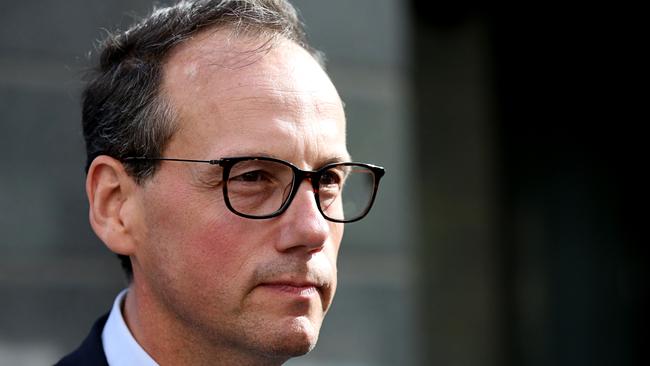ASIC chair James Shipton prepares to fight for his future
James Shipton has pulled together a formidable legal team to protect his interests.

A formidable legal team assembled by James Shipton is poised for battle if Josh Frydenberg seeks to remove him as ASIC chairman without evidence that a row over relocation expenses meets the required standard of misbehaviour.
Mr Shipton, who stood aside last October pending completion of an independent inquiry into the long-running dispute, has hardened his position in recent weeks, amid suggestions that Mr Frydenberg isn’t convinced that the former Goldman Sachs banker should lead an overhaul of the Australian Securities & Investments Commission.
This has prompted Mr Shipton to retain Dominic Gatto, a partner at blue-chip national law firm King & Wood Mallesons, as well as two commercial silks and a junior barrister.
The silks are Philip Crutchfield and Jim Peters, with Nicholas Walter filling the junior’s role.
Mr Shipton’s legal limbo, where he has no option but to await the Treasurer’s next move, is the final instalment in a creeping bureaucratic nightmare which began with the October 2017 announcement of his appointment.
One close observer is emphatic about where the blame lies.
“Treasury has all these loosey-goosey arrangements and processes when it fills these positions and it just invites governance problems,” he tells The Weekend Australians.
“If ASIC were a private company it would never be able to operate this way.”
Previously US-based, Mr Shipton’s tax exposure was complicated by a career which encompassed three jurisdictions – the US, Hong Kong and Australia.
He engaged KPMG to sort through his affairs, but the tab kept getting larger as the work progressed.
An initial charge of $4050 in 2018 more than doubled to $9500, blew out to between $60,000 and $70,000, and then tipped the scales at a jumbo-sized $118,557 in August 2019.
ASIC also paid fringe benefits tax of $78,266 in relation to KPMG’s services.
The accounting firm blamed its mushrooming costs on the complexity of Mr Shipton’s affairs.
An itemised bill shows KPMG completed 2017 and 2018 tax returns for the ASIC chairman in both Australia and the US.
The firm also provided tax advice on personal investments, “optimisation of the Australian taxation of foreign exchange gain or loss in foreign bank accounts”, and assistance in the resolution of Massachusetts state tax notices and penalties due to the late filing of Mr Shipton’s 2017 tax return.
The extraordinary thing about the great ASIC tax debacle is not KPMG’s escalating bill, or the knowledge and actions taken by the key players, but that it even happened at all.
If, for example, there had been a formal document or some kind of contract of employment, Mr Shipton’s relocation expenses would never have become an issue for the baying mob, to be resolved by the rules of the so-called pub test.
But no. The Weekend Australian understands that Mr Shipton accepted the ASIC job without a complete written contract.
He did so was because that’s the way it’s always been.
The chairman of ASIC is a statutory position, with its duties set down in the ASIC Act.
To preserve the role’s independence, any instructions or orders from the government have to be publicly gazetted.
While this means Mr Shipton and the heads of other agencies are not employees and can’t be constrained by an employment contract, sources said a simple exchange of letters covering terms and conditions at the time of appointment would achieve the same purpose.
In the case of ASIC, the letters would be signed by Mr Shipton and the Treasury secretary, approved by Mr Frydenberg, and disclosed to the other ASIC commissioners.
Under the current arrangements, the Remuneration Tribunal sets the ASIC chairman’s salary at $855,364, with relocation costs like those of Mr Shipton covered by the relevant agency’s internal rules.
Treasury was so keen to recruit Mr Shipton that it offered to pay $350,000-$500,000 in relocation costs.
The incoming chairman, who doesn’t have children, ultimately drew down less than $250,000.
While not particularly relevant, it’s back-of-the-couch money for the private sector from which Mr Shipton hails.
The broader issue is that arrangements for relocation and other expenses at the pinnacle of the public service should be professionalised and documented.
Late on a Friday afternoon, on September 25 last year, the subterranean issue of Mr Shipton’s expenses came blindingly to light, when the ASIC chairman was briefed by some of his senior executives about the concerns of Auditor-General Grant Hehir.
It was a confronting moment for the chairman, who immediately resolved to recuse himself from any further discussions about the issue.
ASIC commissioners met on the following Monday without Mr Shipton, as the momentum shifted up several gears.
On October 22, Mr Hehir sensationally wrote in a letter to Mr Frydenberg that the matter was of such importance he was directly contacting the Treasurer to “gain greater confidence that appropriate action would be taken”.
Mr Shipton said the next day he would step aside pending an independent report by the former director-general of intelligence Vivienne Thom.
In the meantime, he would “voluntarily” reimburse ASIC for his taxation-related expenses.
“While I believe that I have acted properly and appropriately in this matter, I hold myself to the highest possible standard,” the chairman said.
Dr Thom’s final report now rests with Mr Frydenberg, as the lengthening delay in the Treasurer’s response fuels speculation that she has made no findings of substance against Mr Shipton.
As a statutory officer, the government’s ability to dismiss Mr Shipton is extremely limited under the ASIC Act.
The power to terminate resides with the Governor-General but only if there’s misbehaviour or physical or mental incapacity.
As Mr Shipton mulls over his predicament, it won’t be lost on him that his career is hostage to the whims of the Liberal Party, for which his father, Roger, once held the ultra-safe federal seat of Higgins.
One of his supporters says: “James voluntarily stepped down as ASIC chairman; the only fair outcome is for him to voluntarily step back in.”






To join the conversation, please log in. Don't have an account? Register
Join the conversation, you are commenting as Logout